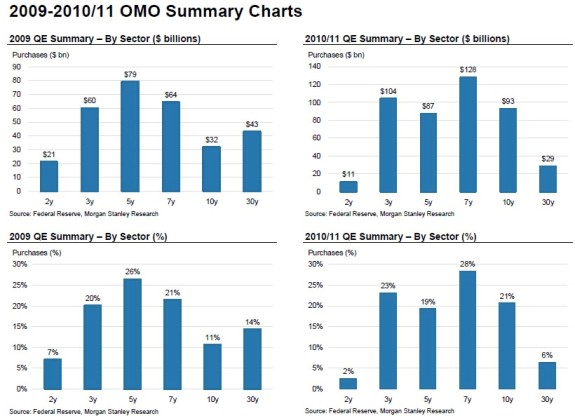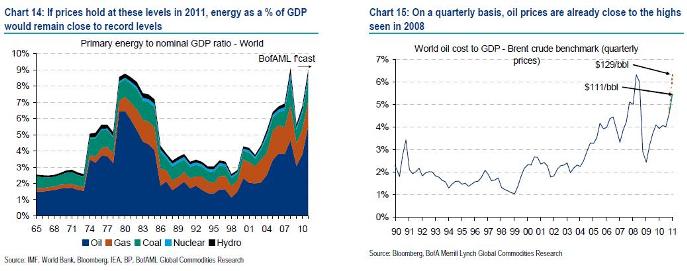Headline crossing indicating that the US has approved the first deepwater drilling permit following the BP accident
RIG, DO, ATW, NE, SLB, HOS, RDC, DVR, ESV, ATW, HAWK, DRQ, TDW, NBR
Tänaseks päevaks on Fed POMO (Permanent Open Market Operations) käigus kokku ostnud $380 miljardi väärtuses USA võlakirju ehk ca pool programmist on läbi saanud. Morgan Stanley on selleks puhuks avaldanud analüüsi, milles on hästi välja toodud, mida Fed õieti soetanud on.

Enim raha on USA keskpank kulutanud 7-aastase võlakirja soetamiseks ($128 miljarit ehk 28%) ning kõige vähem on ostetud 2-aastasi võlakirju ($11 miljardi väärtuses ehk 2% kogusummast).

Enim raha on USA keskpank kulutanud 7-aastase võlakirja soetamiseks ($128 miljarit ehk 28%) ning kõige vähem on ostetud 2-aastasi võlakirju ($11 miljardi väärtuses ehk 2% kogusummast).
BofA/Merrill Lynch on täna väljas "julge" analüüsiga, milles kirjutatakse, et "Libya could well be the 8th largest supply shock since 1950" ehk teisisõnu prognoosivad panga analüütikud tugevat toornafta hinnatõusu.
Analüüsis kirjutatakse, et "in our view, the cocktail of further increases in oil consumption and a severe supply shock makes a spike & crash scenario more likely for global oil prices. Simply, if Brent prices hold at $110- 115/bbl in 2011, energy as a % of global GDP would stay close to record levels, suggesting that the point of demand destruction is in short sight. Even when looked at on a quarterly basis, we find that oil prices are already very close to the exceptionally high levels observed in 2008.
The price elasticity of global oil demand is very low. With a negative supply shock coming on top of a positive demand shock and energy prices reaching critically high levels, the price elasticity of global oil demand will ultimately determine how high oil prices go. Broadly, we would argue that a 10% increase in oil prices pushes down global oil demand by about 0.5%. In other words, a 600 thousand b/d production disruption should impact Brent crude oil prices by about 15% or $15/bbl, in our view. This calculation is consistent with the jump observed in recent days in response to Libya’s output disruption. Worryingly, it highlights the risk of further price rises if more production is shut in."

Analüüsis kirjutatakse, et "in our view, the cocktail of further increases in oil consumption and a severe supply shock makes a spike & crash scenario more likely for global oil prices. Simply, if Brent prices hold at $110- 115/bbl in 2011, energy as a % of global GDP would stay close to record levels, suggesting that the point of demand destruction is in short sight. Even when looked at on a quarterly basis, we find that oil prices are already very close to the exceptionally high levels observed in 2008.
The price elasticity of global oil demand is very low. With a negative supply shock coming on top of a positive demand shock and energy prices reaching critically high levels, the price elasticity of global oil demand will ultimately determine how high oil prices go. Broadly, we would argue that a 10% increase in oil prices pushes down global oil demand by about 0.5%. In other words, a 600 thousand b/d production disruption should impact Brent crude oil prices by about 15% or $15/bbl, in our view. This calculation is consistent with the jump observed in recent days in response to Libya’s output disruption. Worryingly, it highlights the risk of further price rises if more production is shut in."
